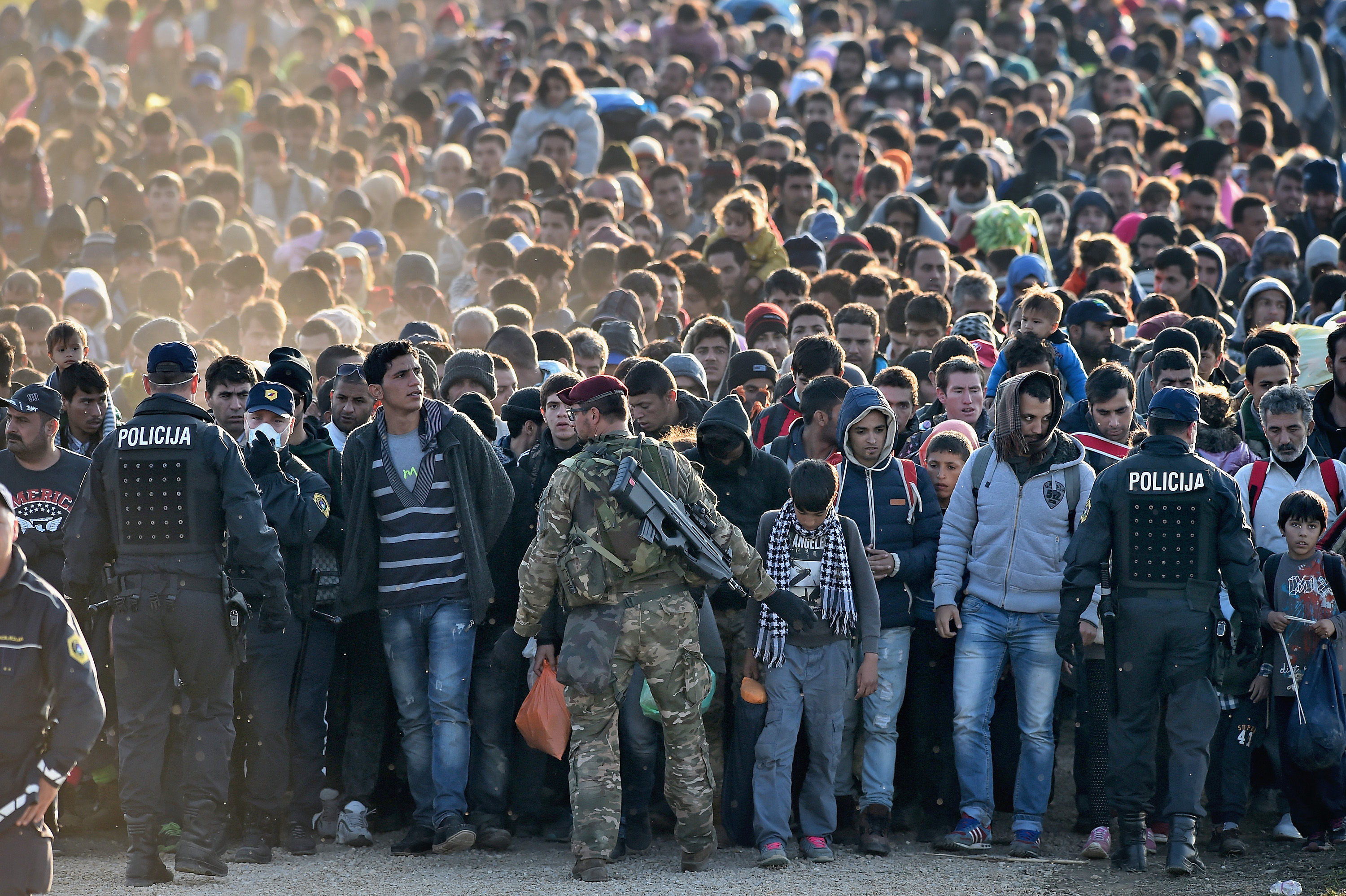Why Europe should build a 'Hong Kong' in Syria
Crazy — or just crazy enough to work?


Have you noticed that migrants from the Middle East are pouring into Europe? And that this has plunged the continent into a political and social crisis?
It seems impossible for Europe, with its stagnating economies and aging population, to integrate these migrants peacefully. Already, they have proved a political boon for far-right and far-left parties across the continent.
Admitting refugees willy-nilly poses a serious security risk — at least one of the perpetrators of the Paris attacks snuck into Europe posed as a refugee. As the social scientist Valerie Hudson has pointed out in an important article, the gender ratio of these migrants is also enormously skewed. As she notes, Sweden could end up having a more skewed male-to-female ratio among teenagers in a few years than world champion China does. And on current trends, some time soon, half of all German residents under 40 could be recent North African and Middle Eastern immigrants and their children. These are big, drastic changes that could destabilize the region.
The Week
Escape your echo chamber. Get the facts behind the news, plus analysis from multiple perspectives.

Sign up for The Week's Free Newsletters
From our morning news briefing to a weekly Good News Newsletter, get the best of The Week delivered directly to your inbox.
From our morning news briefing to a weekly Good News Newsletter, get the best of The Week delivered directly to your inbox.
At the same time, as some conservatives all-too-often forget, there is a moral imperative at play. These migrants are not the vanguard of an invading Saracen army, nor are they on a pleasure cruise. Many are in search of a better future for themselves and their families, which is respectable. A good number are fleeing war and circumstances the likes of which we should only confront in nightmares. Personally, I cannot condone a policy that just says, "Keep out."
Which is why so many of us who try to be both well-meaning and rational feel so stuck between a rock and a hard place. Which is why I'd like to propose a third option that gives everyone at least a little bit of what they want.
Here's how it should work: European countries, led by France and Germany, should carve out a small piece of Syria, on the coast, and probably on the border with Turkey. European nations used to have a very good experience at carving out pieces of foreign land; they should get the hang of it.
Bashar Assad will surely protest. France and Germany should respond that life is tough. We're not there to pick sides in the conflict, we will run no military, intelligence, or special operations out of this territory, and we will leave Assad alone if he leaves us alone (but if he attacks, we will destroy his air force and artillery). And once Syria has a peaceful and legitimate government, we will be more than happy to start negotiations over the status of the new territory. If Russia makes a fuss, France and Germany should make it clear that they will invoke the North Atlantic Treaty's Article 5 in case of a Russian attack.
A free daily email with the biggest news stories of the day – and the best features from TheWeek.com
What's the new territory for? The obvious and explicit model should be Hong Kong. There because of accidents of history, Hong Kong provided millions of Chinese fleeing the horrors of Mao's regime with a shot at a better life and in the process turned into one of the most prosperous and freest places on Earth.
It's a shame that Hong Kong's success hasn't been replicated in more places, since the world could use more city states. There is a project to do explicitly this, called Charter Cities. The idea is that what many poor countries need to flourish are the sort of institutions that rich countries have been good at providing, like basic security, the rule of law, functioning courts, low corruption, and so on. Rich countries should carve out places in the world's poorest countries, and build new Hong Kongs. In the Charter Cities project, this would be done voluntarily with the help of host countries, but for obvious reasons that's not possible in Syria. But the prize is not just mini-Hong Kongs: Hong Kong's success prompted China's leadership to try out that whole capitalism and rule-of-law thing, pulling not a handful of millions, but hundreds of millions of people out of poverty.
This new Syrian Hong Kong should be run by a coalition of European states as a benign dictatorship, just like Hong Kong was. Hong Kong was run autocratically by a British civil service appointee, but inhabitants had the right to free speech, petition, and protest, and the government was accountable. Nice Swedes and Danes who speak English (and learn Arabic via MOOCs) will run the courts at first, and train their replacements and hand over power. Same thing with the police and other government functions. The city will be walled-off from the rest of Syria, with the only entry and exit being through the sea (and, eventually, air) via security checkpoints. With the rule of law and low taxes, the place would quickly become a manufacturing hub, and eventually become a prosperous city. Maybe the oil-rich gulf states, who don't want refugees and have an interest in stabilizing the region, can provide funding. We don't know how to nation-build a place like Afghanistan or Iraq, but we've shown that we can pull off an area of a thousand square kilometers.
Things will be rough going at first, just like they were for Hong Kong, and just like they are for the vast majority of migrants today. Hong Kong in the 1950s was basically a large slum, but because it was a large slum with good government, the slums quickly gave way to high rises.
In this new Syrian Hong Kong, the millions of refugees currently flooding through Europe or languishing in Turkey will be able to have what they've always wanted: basic security, civil rights, and a shot at prosperity. Europe will get more peace and tranquility, and also a shot at making life wonderfully better for millions of people.
And hopefully it would even set an example and prompt the rise of more charter cities all around the world, starting a global movement whose repercussions could improve the lives of millions of people.
Pascal-Emmanuel Gobry is a writer and fellow at the Ethics and Public Policy Center. His writing has appeared at Forbes, The Atlantic, First Things, Commentary Magazine, The Daily Beast, The Federalist, Quartz, and other places. He lives in Paris with his beloved wife and daughter.
-
 How Bulgaria’s government fell amid mass protests
How Bulgaria’s government fell amid mass protestsThe Explainer The country’s prime minister resigned as part of the fallout
-
 Femicide: Italy’s newest crime
Femicide: Italy’s newest crimeThe Explainer Landmark law to criminalise murder of a woman as an ‘act of hatred’ or ‘subjugation’ but critics say Italy is still deeply patriarchal
-
 Brazil’s Bolsonaro behind bars after appeals run out
Brazil’s Bolsonaro behind bars after appeals run outSpeed Read He will serve 27 years in prison
-
 Americans traveling abroad face renewed criticism in the Trump era
Americans traveling abroad face renewed criticism in the Trump eraThe Explainer Some of Trump’s behavior has Americans being questioned
-
 Nigeria confused by Trump invasion threat
Nigeria confused by Trump invasion threatSpeed Read Trump has claimed the country is persecuting Christians
-
 Sanae Takaichi: Japan’s Iron Lady set to be the country’s first woman prime minister
Sanae Takaichi: Japan’s Iron Lady set to be the country’s first woman prime ministerIn the Spotlight Takaichi is a member of Japan’s conservative, nationalist Liberal Democratic Party
-
 Russia is ‘helping China’ prepare for an invasion of Taiwan
Russia is ‘helping China’ prepare for an invasion of TaiwanIn the Spotlight Russia is reportedly allowing China access to military training
-
 Interpol arrests hundreds in Africa-wide sextortion crackdown
Interpol arrests hundreds in Africa-wide sextortion crackdownIN THE SPOTLIGHT A series of stings disrupts major cybercrime operations as law enforcement estimates millions in losses from schemes designed to prey on lonely users



